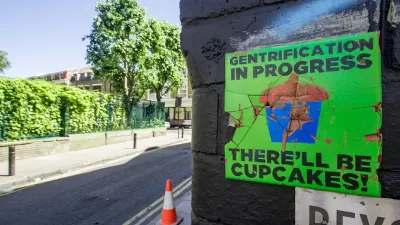Bruce Katz argues that federal investment in urban areas fosters a public/private ecosystem that can prioritize long-term thinking, minimizing the "short-termism" endemic to corporations and governments acting alone.

In a piece for Brookings, Bruce Katz argues that federal investment in cities could counter the short-term thinking common to elected officials and executives focused on quarterly earnings. From the article: "Washington assessments of the forces driving short-termism tend, not surprisingly, to lead to federal proposals to curb the practices of short-term actors. I suggest another approach: provide more support for the places—cities and metropolitan areas—that are already thinking and acting for the long term."
Unlike isolated federal or corporate actions, the urban environment necessitates cross-sector partnerships. "Cities do these things through a mix of investments by a broad range of public, private, and civic investors that cut across sectors as well as jurisdictional and disciplinary lines."
With this in mind, Katz suggests several ways Washington could support long-term solutions in cities, paraphrased below:
- Increase investments in basic science and applied research
- Locate satellites of isolated national energy and military labs near urban universities
- Use new credit enhancement tools around urban infrastructure to attract large-scale private investment
- Increase flexibility in federal grants to let leaders on the ground decide the uses with the highest impact
- Standardize and disseminate data on new instruments like social impact bonds or regional venture funds, letting city networks make smart decisions
FULL STORY: Are cities the cure for short-termism?

Planetizen Federal Action Tracker
A weekly monitor of how Trump’s orders and actions are impacting planners and planning in America.

San Francisco's School District Spent $105M To Build Affordable Housing for Teachers — And That's Just the Beginning
SFUSD joins a growing list of school districts using their land holdings to address housing affordability challenges faced by their own employees.

The Tiny, Adorable $7,000 Car Turning Japan Onto EVs
The single seat Mibot charges from a regular plug as quickly as an iPad, and is about half the price of an average EV.

With Protected Lanes, 460% More People Commute by Bike
For those needing more ammo, more data proving what we already knew is here.

In More Metros Than You’d Think, Suburbs are Now More Expensive Than the City
If you're moving to the burbs to save on square footage, data shows you should think again.

The States Losing Rural Delivery Rooms at an Alarming Pace
In some states, as few as 9% of rural hospitals still deliver babies. As a result, rising pre-term births, no adequate pre-term care and "harrowing" close calls are a growing reality.
Urban Design for Planners 1: Software Tools
This six-course series explores essential urban design concepts using open source software and equips planners with the tools they need to participate fully in the urban design process.
Planning for Universal Design
Learn the tools for implementing Universal Design in planning regulations.
Smith Gee Studio
City of Charlotte
City of Camden Redevelopment Agency
City of Astoria
Transportation Research & Education Center (TREC) at Portland State University
US High Speed Rail Association
City of Camden Redevelopment Agency
Municipality of Princeton (NJ)





























